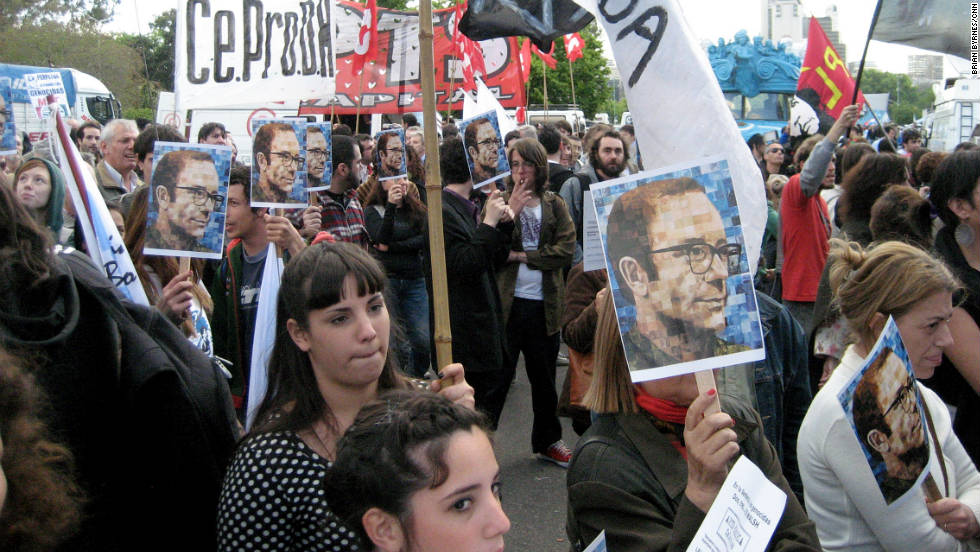
Leading up to President Barack Obama’s historic trip to Argentina this week, his administration dropped a mini-bombshell: The U.S. government would begin declassifying documents related to Argentina’s “dirty war,” the period between 1976 and 1983 when more than 20,000 citizens—known as “the missing” (“desaparecidos” in Spanish)—were secretly detained and tortured and murdered, their bodies never recovered.
Visiting Argentina on the 40th anniversary of the March 24, 1976, military coup that marked the beginning of that period was a political gamble—much less perhaps than his journey to the Castros’ Havana—but a gamble nonetheless.

It was a watershed moment in a relationship that has been fraught for decades, in part because of a disturbing narrative of collusion between U.S. intelligence agencies and the Argentine military establishment which carried out the killings. Whether the narrative is true or not is almost incidental to its overwhelming power in Argentine society.
As so often happens in diplomacy, Obama was forced to strike a delicate balance on this trip.
For example, accusations of the involvement of former Secretary of State Henry Kissinger loom large in the dirty-war narrative, though Kissinger has denied them.
And yet, in public speeches Obama steered clear of mentioning Kissinger or addressing his alleged role. His silence on the subject was deafening.
But Obama also extolled certain Americans who took huge risks to expose the atrocities of the dirty war. Obama praised Patt Derian, the assistant secretary of state for human rights under President Jimmy Carter — who raised the alarm inside the State Department — and Tex Harris, the courageous U.S. Embassy officer who documented human rights abuses and identified the missing. The President should be commended for recognizing these heroes.
As a whole, the trip was exactly what Obama does best: From dancing the tango and drinking mate tea to giving a moving tribute to the victims of the dirty war, Obama basked in applause from an Argentine public often critical of American policy, and a new pro-free market, pro-U.S. government.
And yet the success of the trip was tied inextricably to Obama’s “declassified diplomacy.” In the face of lingering questions not just about the dirty war, but also about U.S. engagement with Argentina’s tragically corrupt governments since then, doubts remain about just exactly what it is that the Obama administration has promised to declassify.
What the President said — and didn’t say — in Buenos Aires has only put those doubts into overdrive.
U.S. National Security Adviser Susan Rice vowed that Obama would “announce a comprehensive effort to declassify additional documents, including for the first time military and intelligence records … to underscore our shared commitment to human rights.”
This is fine rhetoric, but whether the U.S. plans to declassify truly meaningful information that will hold the guilty accountable remains to be seen. A public relations milk run revealing a stack of essentially meaningless classified documents will only serve to antagonize those who suffered during the dirty war. There must be substantive action.
At a minimum, declassification should include all information from the files relating to senior Argentine officials who were directly, or indirectly associated with dirty war atrocities. Files related to prominent “anti-government” figures who were double agents working for Argentina’s military establishment — and American officials who turned a blind eye — also should be released.
Corroborating documents surely lie in the still-padlocked files of the FBI, CIA, and Defense Department.
Shadowboxing with history remains a fundamental challenge not just for the Argentines, but for the United States as well, as world attention fixes on effectively protecting ourselves against terrorist organizations.
When they initiated their largely clandestine slaughter in Argentina, members of the military junta loudly proclaimed that their fight was the “opening battle of World War III” against terrorist guerrillas. However, as the late FBI legal attache Robert W. Scherrer (another U.S. hero in the fight against the dirty war) noted not long after he left Buenos Aires:
Terrorism was a convenient vehicle for irresponsible elements of the military and their civilian counterparts to seek retaliation against real or imagined wrongs. … The true reason for the coup was the disastrous state of the Argentine economy and the gross corruption of the Peronist government. At no time did terrorism ever represent a threat to the stability of the government.”
In that sense, the U.S.-Argentina relationship offers a critical lesson for the United States as it seeks effective ways to fight ISIS and al Qaeda — among other organizations — without selling out completely to corrupt and oppressive regimes across the Middle East.
As reported by CNN
